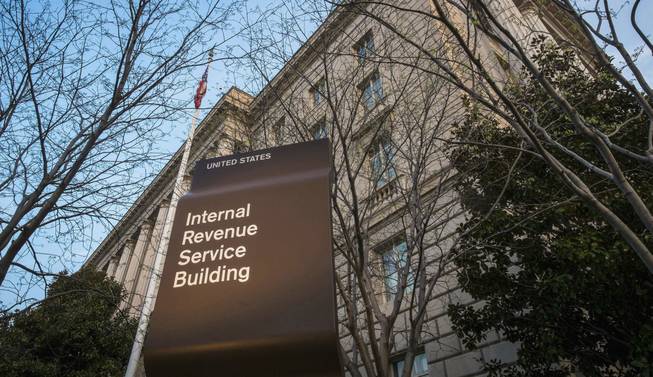
J. David Ake / AP File (2014)
This April 13, 2014, photo shows the Internal Revenue Service headquarters building in Washington.
Sunday, Dec. 16, 2018 | 2 a.m.
View more of the Sun's opinion section
Taxpayers probably aren’t shedding many tears over a new report showing that the Internal Revenue Service is in bad shape. In fact, they might even be cheering.
But what’s happening with the IRS has sobering consequences. Oh, it’s great for corporations and tax cheats, but not for average taxpayers who follow the rules, and especially not for low-income Americans.
As reported by ProPublica after a lengthy investigation, years of budget cuts have left the IRS starved for staff and bleeding out experts who are capable of handling the most complex filings, like those submitted by corporations and the very rich.
Among the most jarring findings was that the agency’s staff of auditors dwindled to 9,150 last year, making 2017 the first year since 1953 that the IRS had fewer than 10,000. At that time, the economy was a seventh of its current size, ProPublica reported. The auditing crew is down a third since 2010, the year before severe budget cuts starting hitting the IRS.
Americans may say “Good riddance,” but the staffing cuts are resulting in billions of dollars in lost government revenue — money that could have otherwise been used to fund the military, infrastructure, health care for veterans and the elderly, and any number of other programs and services that benefit Americans.
The news organization estimated the losses at $18 billion a year, but added that “the true cost could easily run tens of billions of dollars higher.”
Among the disturbing details of the story:
• The IRS has drastically cut back on pursuing people who don’t file tax returns. Investigations of so-called nonfilers plunged from 2.4 million in 2011 to 362,000 in 2017. That’s a win for scofflaws, but only at the expense of those who dutifully file their returns.
• Similarly, there’s been a major scale-back in pursuing collections from people who have filed but haven’t paid. There’s a 10-year window for those collections. The IRS reported that $8.3 billion in obligations lapsed in 2017, compared with $482 million in 2010.
• The IRS conducted 42 percent fewer audits in 2017 than in 2010. The total number was down 675,000.
• Top-level examiners are “leaving in droves,” leaving the IRS less able to uncover problems in filings from corporations and billionaires. That’s especially disconcerting, since wealthy people generally benefit the most from tax dodges and therefore tend to push the envelope harder. That being the case, investigators who are able to catch abuses by the wealthy are a critical need.
• On the flipside, years of pressure from Republicans have prompted the IRS to prioritize auditing of Americans eligible for the earned income tax credit, which is aimed at helping the working poor. Thirty-six percent of the IRS’s audits in 2017 were on returns filed by that group. “The credit’s recipients — whose annual income is typically less than $20,000 — are now examined at rates similar to those who make $500,000 to $1 million a year,” ProPublica reported.
As lawmakers continue to gut the IRS, the ramifications are serious. With the Republicans’ recent tax cuts already poised to push the budget deficit past $1 trillion, the loss of revenue will only deepen that hole.
And if more Americans take advantage of the staffing reduction by cutting corners or downright cheating, the problem will snowball. Here’s hoping that doesn’t happen — and it’s well worth noting here that there’s still a long window for prosecution of tax violations, and the punishments are steep.
Still, one potential outcome to the current situation is that lawmakers could be forced to raise taxes to deal with the deficit and maintain government operations.
Granted, the IRS at times has been well deserving of its black-hat reputation, including when it targeted conservative nonprofits for scrutiny during the 2010 and 2012 elections.
But it’s worth questioning why the gutting is continuing unabated under President Donald Trump. This is a president whose taxes have been subject to frequent examination because they are, apparently, on the edge of improper. Is someone who plays fast and loose with taxes hampering tax enforcement? And how is that justifiable under a supposed “law and order” president? It’s actually more consistent with a tax cheat’s behavior.
In less polarized times, lawmakers from both parties held their noses and supported maintaining the IRS at a functional level.
Like it or not, the agency plays a critical role. Americans may love to hate the IRS, but most also aren’t crazy about paying their own taxes while cheats go free, either.
Until Congress releases its choke-hold, though, the agency will get a lot weaker — and soon. ProPublica said nearly a third of the IRS’s employees are nearing retirement, and are likely to do so amid sinking morale.
Pledging to gut the IRS may draw cheers for politicians. But in the cold light of day, it’s irresponsible leadership.
